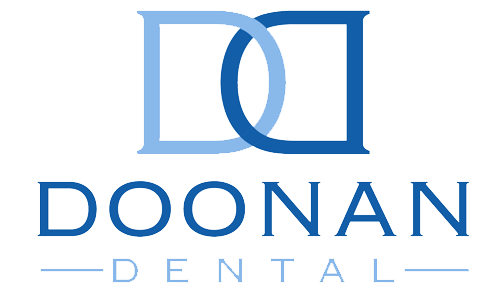Dental FAQs
Want To Learn More?
We have answered some of the most frequently asked questions below. Have we missed something? Get in touch and our friendly staff are happy to assist.
Frequently Asked Dental Questions
Trips to the dentist can be daunting. Staying well informed can help you make the best decisions for your oral health. At Doonan Dental we are dedicated to helping you achieve optimal oral health.
Visiting the dentist regularly is important for maintaining good oral health. Not only will this ensure your teeth and mouth healthy, but the rest of your body as well!
- Helps prevent tooth decay
- Protects against periodontal (or gum) disease, which can lead to tooth and bone loss
- Prevents bad breath
- Gives you a more attractive smile (helping boost your confidence)
- Keeps teeth looking bright by preventing them from becoming stained and discoloured
- Strengthens your teeth
There are a number of signs of dental trouble. Unfortunately, a number of people will wait until they have a problem until they seek any care at all. Here are some of the early signs to look out for:
- Mouth sores
- Jaw pain
- Tooth sensitivity
- Redness and swelling
- Broken or cracked teeth
- Dry mouth
- Bleeding gums
- Bad breath
- Bad taste in your mouth
You can help keep your teeth and gums healthy by:
- Brushing your teeth twice a day with fluoride toothpaste
- Cleaning between your teeth every day (flossing or using an interdental brush)
- Eating a balanced diet and avoiding sugary snacks
- Brushing your tongue
- Avoiding smoking
- Scheduling regular checkups
Even if your teeth look and feel fine, it is important to book regular checkups with your dentist. This is because some problems, such as tooth decay and gum disease, do not always have any symptoms in the early stages.
Checkups also provide an opportunity for your dentist to detect any potential problems early on, before they become more serious. It is generally recommended that you see your dentist every six months. For patients at risk for oral cancer or gum disease may be required to see the dentist more often.
Simply get in touch! Our staff are happy to assist and help schedule your next dental treatment.
At Doonan Dental, we pride ourselves on our dedication to providing our patients with industry-leading service and with a focus on holistic treatments and preventative care. We understand that visiting the dentist can be a daunting experience for some, which is why we go above and beyond to make sure our patients feel comfortable and relaxed during their time with us.
Patients should seek root canal treatment to avoid infection, crowding and tooth decay.
Removal is preferred for the following reasons:
- Decrease crowding in the smile, minimising the need for orthodontic treatment
- To minimize problems like pain, infection and decay
- To avoid impaction
Wisdom teeth can cause a lot of pain due to the fact that often the jaw is not big enough to accommodate for new eruptions. Due to this lack of space in the oral cavity, wisdom teeth can become impacted and cause infection. In this instance, removal is the best option.
Our dental professionals will do everything they can to ensure you are as comfortable as possible throughout your wisdom tooth removal. We also perform a thorough evaluation before removal to search for infection in the tooths pulp, and to determine the best solution for treatment.
You may have a tooth infection if you have any of the following symptoms:
- You experience spontaneous pain when chewing or biting
- Your teeth feel sensitive toward hot and cold foods and beverages
- Looseness of the tooth
- The gum near the affected tooth appears to be swelling
- If you have pus surrounding the affected tooth
- If you experience facial swelling
Root canal treatment, known as endodontic treatment, is the removal of the tooth’s pulp, a small, thread-like tissue in the centre of the tooth.
The inside of the tooth can become infected due to a small fracture in its surface, which can cause bacteria to seep through and destroy the nerve fibres. If you are experiencing any sharp pain when chewing or biting on foods you may have an infection that will require root canal therapy.
To save the damaged tooth, the diseased tooth pulp is removed, cleansed, shaped and filled to regain normal function.
Composite bonding uses a tooth-coloured composite resin to repair decayed, fractured, chipped, or discoloured teeth. Unlike traditional veneers that may take longer periods to complete, cosmetic bonding can be completed within a single visit.
Composite resin can be bonded to the exact shade of your tooth and polished and shaped to appear as natural. Bonding can be used to restore the appearance of chipped, discoloured or cracked teeth without the blemish ever appearing to be apparent.
Composite bonding can also be used to close gaps in the smile, elongate the teeth, and the total shape and colour of their appearance
It is possible to fit a dental implant in just one day!
However, we would recommend you follow a slower path, which is more predictable and costs less. After all, this is something we hope will last you for a very long time! Usually, we will wait 6-12 weeks after taking the tooth out before placing the implant.
When we place the dental implant, we wait around 6-12 weeks for the bone to attach to it.
It usually takes around 2 to 4 weeks to make the final crown. There are a number of factors that can cause the process of fitting a dental implant to take longer but in general we can complete an implant in around 3 to 6 months depending on the complexity. Or we can do it in a day in certain specific situations if you are willing to accept an increased chance of complications and expense.
Dental implants should not be placed until growth has stopped, which is usually around 18 years of age.
Most patients who are in good general health with good oral hygiene, are suitable for dental implants although a thorough oral and medical assessment is required to make the final decision.
There are a number of factors that might slightly increase the chance of implants not working as well as they should, these include:
- lack of bone
- an active periodontal disease
- poorly controlled diabetes
- bisphosphonate medication
- poor oral hygiene
- smoking
- certain systemic diseases
- Dental implants are a long lasting solution to missing teeth
- They are very similar to your natural teeth in appearance, feel and function
- They restore your bite by stopping the remaining teeth on either side of the space moving and rotating, which often makes it difficult to chew food efficiently
- They improve the appearance of your smile
- They reduce the appearance of premature ageing and wrinkles
- They may help retain bone structure
A denture is a removable acrylic plate or metal frame that replaces one or more missing teeth. If it replaces all the teeth it is called a Full Denture and if it replaces just some of the teeth it is called a Partial Denture.
Dentures have been around for many years, in fact one of George Washington’s dentures carved from hippopotamus ivory can be viewed at the Royal London Hospital Museum dated from around 1750.
Dentures have to be removed daily for cleaning and this represents one of their major disadvantages.
The main advantages of a dentures are that they:
- Can often be made to look more natural than other options
- Does not involve invasive surgery
- Is relatively straight forward to make
- Is often less expensive than other options
The main disadvantages of a denture are that:
- It has to be removed daily for cleaning
- Some people cannot tolerate them in their mouth
- It can cause pressure on the gums and teeth
- It may increase the chance of gum disease and dental decay of remaining teeth
- It is hard to eat some foods with full dentures, such as lettuce and peanut butter.
We don’t carve dentures from hippopotamus ivory or lead anymore. Today, we use a variety of techniques using high strength dental acrylics or medical grade metal frameworks. In many respects, making dentures is becoming a lost art due to the decreasing number of patients who require this service.
To a large extent, the success of a denture depends on the ability of the person wearing it to accommodate its inherent disadvantages such as; the requirement to remove and clean it daily, the possibility of small amounts of food becoming trapped under it, its movement during eating and speaking and the embarrassing risk of it falling out in public.
However, there are a number of ways to minimize all of these problems. People wearing an average denture often report a great improvement to their life when an improved denture is made. The most important factor in making a good denture is allowing sufficient time to assess the unique problems faced by each individual and then to design the denture accordingly.
Whilst it is possible to make a denture in one visit, if we want to achieve the best result it can often take 6 to 8 visits. Secondly, many dentists typically pass the job of making the denture to a technician, who they may have never even met. By taking control of the technical side as well, your dentist is even more likely to create the best result possible.
Keith Doonan usually performs the technical construction of the dentures for his patients himself to ensure the best result
Whilst a lot of people with dentures continue to lead normal lives there is one group of people who report to have more severe problems. The vast majority of people are not fully satisfied with their lower full denture even when it has been made to the highest standard. There are a number of reasons for this:
- The lower gums are more delicate and have less area to provide support for the denture
- The tongue is attached to the lower jaw and tends to move the lower denture during eating and speaking
- The lower jaw itself moves during eating and speaking
- The shape of the lower jaw usually has less undercut areas which can be used to make the denture stay in.
It has been shown through a number of research papers that people with lower full dentures can improve their lives considerably by placing 2 dental implants in their lower jaw onto which the denture can be clipped.
The price of this has dropped considerably over the last few years and, whilst still significant, it can be done for a fraction of what it used to cost.

